
500,000 Face Deportation as Haiti Struggles with Violence, Hunger
New York, N.Y. – The Department of Homeland Security (DHS) has announced the termination of Temporary Protected Status (TPS) for approximately 500,000 Haitian immigrants living in the United States, effective September 2, 2025.
The decision, led by DHS Secretary Kristi Noem–the “ICE Barbie”–claims that conditions in Haiti have improved sufficiently to deem it safe for return [Noem: Luce Index™ score: 45/100]. This move, part of the Trump administration’s broader immigration crackdown, has sparked fierce debate, with critics highlighting ongoing violence and instability in Haiti as evidence that the country remains unsafe.
The decision leaves hundreds of thousands of Haitians facing potential deportation to a nation grappling with gang violence and humanitarian crises.
A Controversial Decision

U.S. Department of State website on June 28, 2025: “DO NOT TRAVEL TO HAITI DUE TO KIDNAPPING, CRIME, etc.
On June 27, 2025, DHS announced the end of TPS for Haitians, a program that has provided deportation protections and work permits to immigrants from countries facing significant turmoil since its inception in 1990.
The TPS designation for Haiti, initially granted after the devastating 2010 earthquake, has been extended multiple times due to ongoing crises, including natural disasters and political instability.
DHS now asserts that “the environmental situation in Haiti has improved enough that it is safe for Haitian citizens to return home,” a statement that has drawn sharp criticism from advocates and lawmakers.
The decision aligns with President Donald Trump’s campaign promises to scale back humanitarian immigration programs and prioritize mass deportations [Trump: Luce Index™ score: 35/100]
DHS encourages affected Haitians to use the CBP Home mobile application to arrange their return, offering a complimentary plane ticket and a $1,000 exit bonus to facilitate departure.
However, the State Department’s current “Level Four” travel advisory (above), warning against travel to Haiti due to kidnapping, crime, and limited healthcare, underscores a stark contradiction in the U.S. government’s stance.
Haiti’s Ongoing Crisis
Despite DHS claims of improved conditions, Haiti remains mired in chaos. Armed gangs control up to 90% of Port-au-Prince, the capital, displacing 1.3 million people—roughly 11% of the country’s population—according to the International Organization for Migration. Schools, hospitals, and homes are regularly targeted, and nearly half the population faces acute hunger.
A U.N. human rights expert, William O’Neill, warned in March 2025 that deporting Haitians to such conditions would be unsafe, describing the nation as a “warzone.” The absence of elections for nine years further exacerbates political instability, making the DHS’s assessment highly contentious.
Haitian communities in the U.S., particularly in South Florida, home to the largest Haitian diaspora, are reeling from the decision. Many TPS holders have built lives in the U.S. over decades, contributing to industries like healthcare and transportation. Todd Schulte, president of FWD.us, emphasized that deporting these individuals “will come with an economic cost to all Americans,” highlighting their essential roles in the workforce.
Community and Political Backlash
The decision has ignited outrage among advocates and elected officials. Rep. Ayanna Pressley [Luce Index™ score: 94/100] described it as “an act of policy violence that could literally be a death sentence,” pointing to the State Department’s travel warnings as evidence of Haiti’s dangers.
Posts on X echo this sentiment, with users like @RepMaxwellFrost accusing the Trump administration of “actively lying” to justify the termination amid a humanitarian crisis. Amnesty International USA condemned the move as “cruel and dangerous,” labeling it a continuation of racially charged immigration policies.
Heather Yountz, a senior immigration attorney at the Massachusetts Law Reform Institute, called the claim that Haiti is safer “preposterous,” noting that deportees risk returning to neighborhoods overtaken by gangs. In Cap-Haitien, residents expressed alarm over the potential influx of returnees, citing strained resources and overcrowding.
What’s Next for TPS Holders?
The TPS designation for Haitians expires on August 3, 2025, with deportations set to begin a month later.

DHS advises affected individuals to pursue other lawful immigration statuses, such as asylum, though the process is complex and uncertain.
Some Haitians may qualify, but the number who will secure alternative protections remains unclear.
The Trump administration’s broader immigration agenda, including the revocation of TPS for Afghans, Venezuelans, and Cameroonians, and a Supreme Court ruling in May 2025 allowing the termination of parole for Cubans, Haitians, Nicaraguans, and Venezuelans, signals a systemic rollback of humanitarian protections.
The decision has also reignited debates over Trump’s inflammatory rhetoric, including baseless claims during his campaign that Haitian immigrants in Springfield, Ohio, were eating pets.
Such statements, amplified by Vice President JD Vance, have fueled anti-immigrant sentiment, further complicating the narrative around Haitian contributions to U.S. communities.
For many Haitians in the U.S., the prospect of returning to a country
where they may lack homes or safety is daunting, if not a death sentence.
A Call for Action
The termination of TPS for Haitians raises urgent questions about U.S. immigration policy and humanitarian obligations. Advocates urge the public to contact elected officials to push for reinstating TPS or creating pathways to permanent residency for affected Haitians.
Supporting organizations like Amnesty International USA, which provide legal and advocacy resources, can amplify efforts to protect vulnerable communities. Engaging with local Haitian diaspora groups to understand their needs and share their stories is another critical step.
Cruel Joke: Haiti Declared ‘Safe’ for Immigrants in U.S. to Return (June 28, 2025)
Summary for Audio File
The Department of Homeland Security has ended Temporary Protected Status for 500,000 Haitians, claiming Haiti is safe for return despite ongoing gang violence and displacement. Effective September 2025, this decision risks deporting many to a nation in crisis, drawing criticism from advocates and lawmakers who call it cruel and contradictory to State Department warnings. Haitian communities face uncertainty, prompting calls for action to reinstate protections.